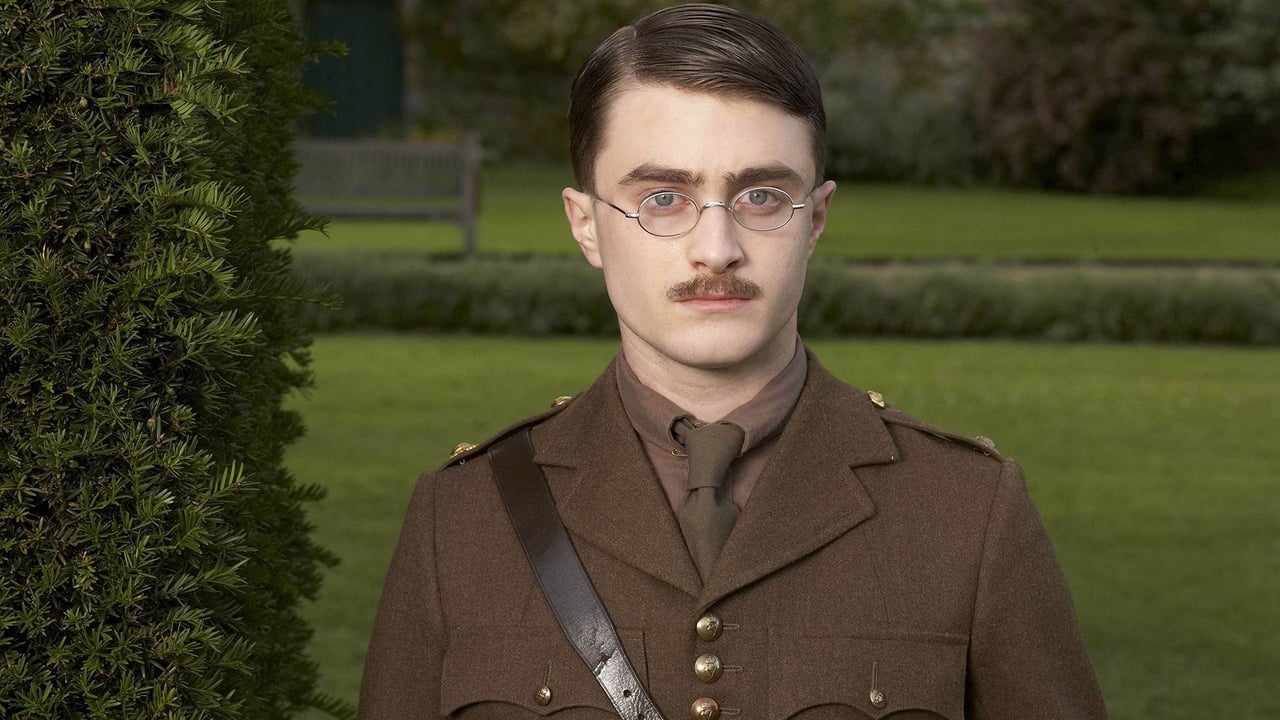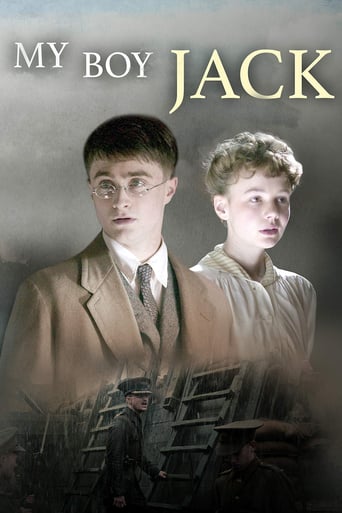

I found this on DVD from my public library.David Haig, who stars as Rudyard Kipling, is one of the Kipling experts. He has studied him, wrote and starred in the stage play, and now credited as the writer and star for this, the movie. All of it is fact-based and, considering Haig's participation, likely to be very close to what actually happened.Daniel Radcliffe (of Harry Potter fame) was about 18 during filming and he plays the son, Jack Kipling, who was 17, about to turn 18. The times were tense in 1914 and Germany was threatening the peace in Europe and the British Isles. When the King of England declared war, the rush was on to get as many able-bodied men in the service, the survival of England depended on it.Jack was a peculiar case because he had very poor uncorrected vision, and the military was reluctant to take him. But dad, the famous author, pulled strings and young Jack was trained as an infantry officer.Young Jack was a brave and competent soldier, unfortunately he and most other were obliterated in a battle in France. But the story of Jack and his bravery, in the face of strained family dynamics is a good one. Kim Cattrall is good as the American wife and mother, Caroline Kipling. And Carey Mulligan is good as the older sister, Elsie Kipling.
... View MoreAlthough Rudyard Kipling was a poet of genius, he is also one of the most controversial figures in English literature, largely because of his close association with British imperialism. Yet to my mind the greatest blot on his reputation is not his support for the British Empire- an institution which had more merits than many of its detractors are willing to allow- but his passionate advocacy of British entry into the First World War, something motivated less by "King and Country" patriotism than by an obsessive hatred of Germany and the German people. "My Boy Jack" examines the relationship between Kipling and his son John, who died in the war; John Kipling is always referred to as "Jack" in the film, although there has been some debate as to whether he was ever called Jack in real life. The title, however, derives from Kipling's bleak and haunting poem, written to express his grief at his son's death:-" 'Have you news of my boy Jack?' Not this tide. 'When d'you think that he'll come back?' Not with this wind blowing, and this tide. When war breaks out in 1914, Jack is sixteen years old, and like many young men of his generation is eager to serve his country in the armed forces. Unfortunately, he suffers from poor eyesight and is turned down on that ground by both the Royal Navy and the Army. Kipling, however, has powerful friends, including King George V and the famous General Lord Roberts, and by pulling strings is able to obtain Jack a commission as a Second Lieutenant in the Irish Guards. Despite his youth and his disability, Jack proves an exemplary officer; he is a disciplinarian, but fair and popular with his troops. He is also courageous, as he is to prove when in September 1915, the day after his eighteenth birthday, he is ordered to lead his platoon into action in the Battle of Loos. During the attack, however, he disappears and, beyond a telegram to say that he is missing in action, the family hear nothing about him for the next two years. The rest of the film deals with the efforts of Kipling and his American wife Carrie to find out what has happened to their son and their grief as they gradually come to accept that he will not be returning from the war. Rudyard Kipling is played by David Haig, who also wrote the play on which the film is based. Haig certainly bears a close resemblance to the real Kipling, and although his tone of voice and testy manner occasionally reminded me a bit too much of John Cleese's Basil Fawlty, it was overall a moving performance, especially in the later scenes when the ardent jingoist gives way to the anguished father, haunted not only by grief but also by guilt at the part he played in obtaining his son a commission. Daniel Radcliffe, who plays Jack, and Kim Cattrall, who plays Carrie, are both actors who might suffer from typecasting, Radcliffe struggling to escape the shadow of Harry Potter and Cattrall that of Samantha in "Sex and the City". Even away from Hogwarts Radcliffe seems doomed to play mild-mannered, bespectacled teenagers. Cattrall here shows that she can play in serious dramas and that her range as an actress is wider than I had previously suspected; even so, I doubt if in real life Carrie Kipling had quite so much of the "sexy older woman" about her. I have never seen Haig's original play, but I understand that it continued to follow Kipling's life into the 1930s. The film does not, but ends when Kipling and Carrie track down one of Jack's platoon who tells them how their son died. I think that in this the film missed an opportunity to examine the wider question of Kipling's guilt, not his guilt as a father who sent his son off to war, but his guilt as an opinion-former who helped to whip up war-fever in 1914, when he was an immensely popular and influential figure. We never learn whether Kipling ever regretted his role in creating a climate of hatred against Germany. Kipling learns that Jack died bravely leading an assault on a German machine-gun position; by the standards of 1915, or even 1918, he was a hero who had selflessly given his life in a noble cause. By the time Kipling himself died in 1936, however, the world was starting to look very different. During the First World War no great ideological gulf had separated the two sides, and the leaders on both sides had justified their decision to go to war through a campaign of increasingly hysterical hate-propaganda which proclaimed that only the total victory of Our Side (Good) over Their Side (Evil) could ensure peace, freedom and the survival of European civilisation. After victory in 1918 Britain and her allies pretended that these noble ideals had finally been achieved, but by the 1930s it had become clear that all the war had achieved was to test that civilisation close to destruction, to facilitate the rise of totalitarian ideologies and to pave the way for a second conflict which threatened to be even more destructive than the first. (To Kipling's credit, he was, at the end of his life, one of the first in Britain to see the dangers of Nazism). The patriotic rhetoric of 1914, and the ideals for which John Kipling had died, were starting to look very hollow. 7/10
... View MoreThe first important role for Daniel Radcliffe as an actor was certainly his opportunity to play Harry Potter, the magical boy attending a parochial school for wizards. His second may be this role as a young officer commissioned to fight and risk his life in the Great War. This part allowed Radcliffe to spread his acting wings and prove he has a range and ability that goes beyond Hogwarts. Radcliffe will probably always be grateful to Harry Potter but he needed a role to branch out into other challenging worlds.The setting is a 180-degree turn from Harry Potter: the early days of World War I in Britain, circa 1914. As the title character of a period piece, Radcliffe plays Jack Kipling, a young man caught up in the fervor that swept British youth at the outbreak of the "war to end all wars". The army at first rejects him because of his eyesight, but his father, the immortal Rudyard Kipling, played with equal fervor by David Haig, pulls certain strings to get his son into basic training and eventually the western front. But his wife, played brilliantly by Kim Cattrall, and their daughter, played with beautiful subtlety by Carey Mulligan, are devastated by their attitude about Jack's entering the war.In a particularly fine sequence of scenes, when Radcliffe leaves his family to enter basic training, he seems like a boy about to go to school for the first time. But when he returns home as an officer, his demeanor has become that of a man. Radcliffe does a fine job of displaying the subtle transformation from adolescence to maturity. Jack becomes an officer before he is 18 years old. The film then moves between the home of the Kiplings in a beautiful manor in rural England and the devastating world of trench warfare on the western front.A fine film all around, and again, a breath of fresh air for the likes of Radcliffe who has proved that he can play parts quite removed from fantasy. Radcliffe will probably enjoy a long and fruitful career. Harry Potter certainly spring-boarded him into an acting career. But Jack Kipling helped him establish that he can swim in deeper waters.
... View MoreI found Haig's performance over the top...too intense and aggressive. Clearly he wanted to show Kipling's zest for empire and war, but he overdid it. Radcliffe on the other hand gives a controlled performance that reaches its climax in his death scene. He was masterful there, even jerking some tears, I bet, from the most hard hearted. The kid (he's only 18) really can act given the right material. He also can be terribly funny as he was in Extras. It would be nice to see him in some good comic material. I find his acting in the Potter series okay but it is subordinate to the special effects and doesn't really give him a chance to show the range of what he can do. I think his best performances have been in David Copperfield (where his genuine innocence was perfect for the part), in Extras (real comic tour de force that), and now in My Boy Jack.
... View More